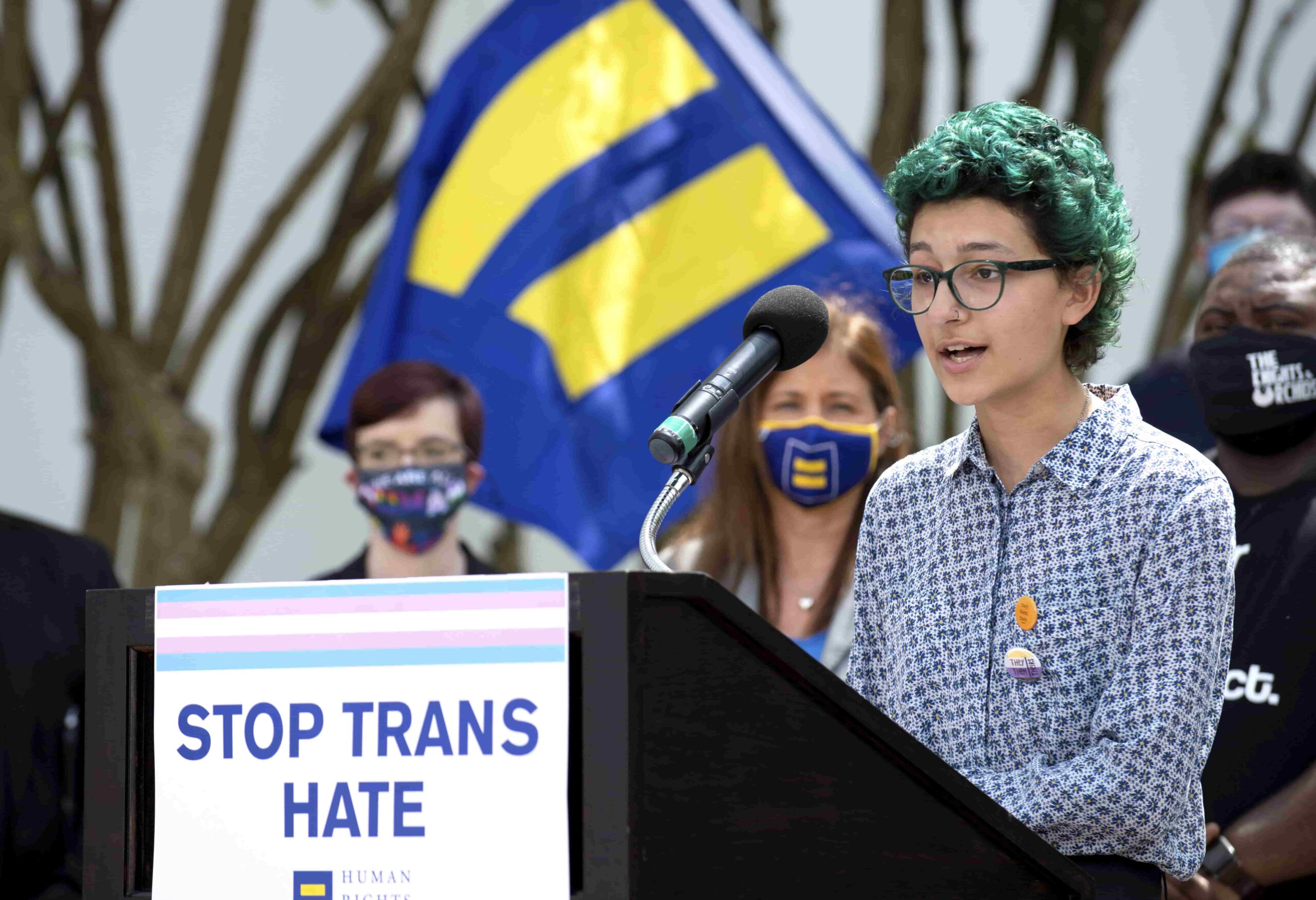Alabama’s trans youth medical care ban went into effect on May 8, making it the first U.S. state with a law on the books criminalizing gender-affirming treatments for minors.
Senate Bill 184 makes it a felony for doctors or other medical professionals to administer medications like puberty blockers or hormone replacement therapy (HRT) to youth under the age of 19. Signed into law by Alabama Gov. Kay Ivey on April 8, the bill was scheduled to become law in 30 days unless a court issued an order preventing it from becoming official policy.
Although civil rights groups lobbied for a court order enjoining SB 184, the Alabama judge hearing the request did not issue his ruling prior to Sunday’s deadline.
Judge Liles Burke urged patience as he weighs the facts of the case, after supporters and opponents of SB 184 gave testimony before the U.S. District Court for the Northern District of Alabama last week. According to the local news site AL.com, Burke said the three-day hearing presented a “complicated case that raises complex and important issues and consists of many hundreds of pages of briefing and exhibits.”
“The Court has made very substantial progress toward crafting an opinion in this matter and expects to file the opinion by the end of this week, if not sooner,” he said in a statement.
“The state proposes an experiment on a grand scale. All transgender youth in Alabama suffering from gender dysphoria should be guinea pigs.”
Trans-affirming medical providers argued last week that ceasing medical care to young people already receiving treatment for gender dysphoria could be extremely dangerous; even deadly. Linda Hawkins, co-founder of the Gender and Sexuality Development Program at the Children’s Hospital of Philadelphia, compared the effects of SB 184 to “removing somebody’s cancer treatment and expecting them to be okay” in comments cited by the Associated Press.
The law could also have grave consequences for medical providers, who face up to 10 years in prison for prescribing treatments that are, in many cases, life-saving.
Dr. Armand Antommaria, director of the Ethics Center at the Cincinnati Children’s Hospital, testified to the court that SB 184 places healthcare workers in the “untenable position of violating ethical obligation to patients to conform with the law or fulfilling professional obligations to their patients and being criminally charged,” as the Alabama newspaper Montgomery Advertiser reports.
Jeffrey Doss, the attorney representing doctors and families of trans youth challenging SB 184, claimed the law “supplants parental judgment and replaces it with the state’s.”
“That’s an untested proposal,” Doss told the courtroom last week, during closing arguments. “The state proposes an experiment on a grand scale. All transgender youth in Alabama suffering from gender dysphoria should be guinea pigs.”
Attorneys for the state of Alabama, which is defending the law, referred to gender-affirming treatments for trans minors as “unproven and sterilizing” during their defence. Witnesses who spoke in favour of SB 184 included a Georgia woman who regrets the testosterone therapy she sought at 19, and a Toronto psychiatrist who treats trans adults, but opponents of the ban noted that neither of their testimonies pertained to the scope of the law.
Twenty-three leading U.S. medical groups, including the American Academy of Pediatrics (AAP), have called on the Alabama district court to enjoin SB 184.
While Alabama is not the first U.S. state to sign a law targeting trans youth medical care, Arkansas’ legislation never had the opportunity to go into effect. After Republican lawmakers forced through House Bill 1570 last year, despite a veto from Gov. Asa Hutchinson, a court temporarily blocked the law as LGBTQ2S+ advocacy groups sue to overturn it. HB 1570 was set to become official policy 90 days after the state legislature wrapped for the 2021 session.
Arkansas’ trans youth medical care ban is more modest in scope than the Alabama law. While HB 1570 bans both medications and surgery for gender dysphoria, it stops short of jailing healthcare providers who do not follow the order.
A record 167 bills targeting trans people have been introduced in the U.S. this year, the majority of which target medical treatments and athletics participation for children. No other state has signed a Alabama-style ban on trans healthcare, but at least six have enacted legislation limiting the ability of trans student athletes to play school sports in alignment with their lived gender.
Several studies have taken issue with the reasoning behind youth medical care bans, which often assert that most trans youth grow out of early feelings of gender dysphoria. Findings published last week in the journal Pediatrics indicated that 94 percent of trans youth participants still identified as trans five years after researchers initially began observing them. Another 3.5 percent of youth identified as non-binary, meaning that just 2.5 percent of young people later aligned with a cisgender identity.
A report from experts at Yale and the University of Texas Southwestern, meanwhile, found that Alabama’s ban relied on widespread misinformation and false, outdated data regarding trans youth healthcare.


 Why you can trust Xtra
Why you can trust Xtra


